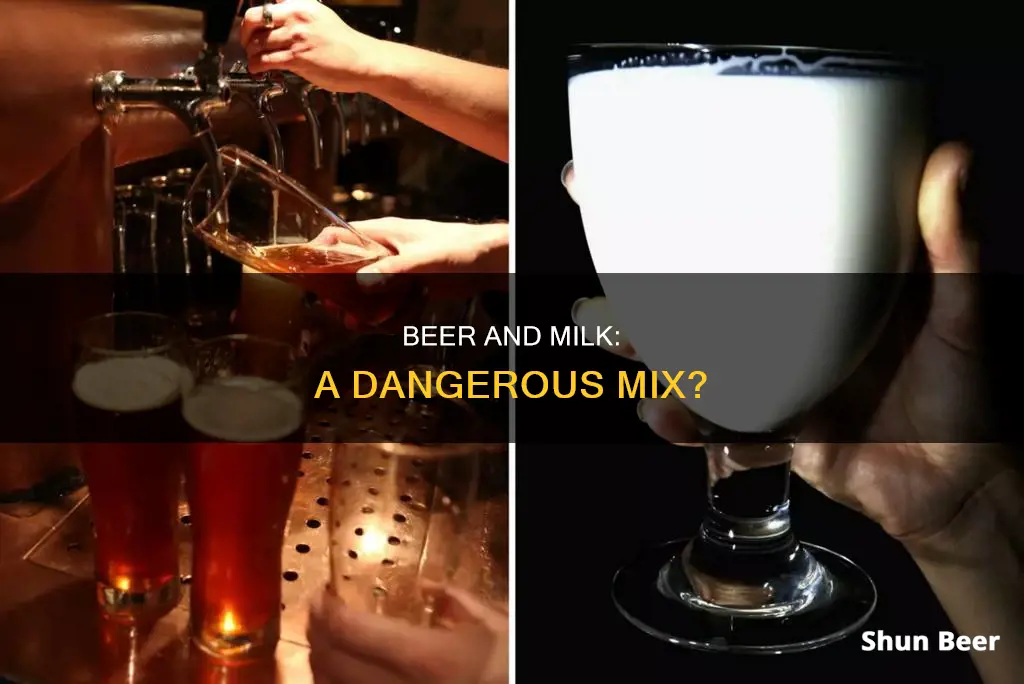
Drinking beer and milk together has been attempted before, with a Japanese beer company previously releasing a product called Bilk, which was a combination of beer and 30% milk. However, it is generally believed that milk and beer do not mix well together. Beer, like all alcohol, is naturally acidic, and this acidity can cause milk to curdle. Additionally, consuming milk before drinking alcohol is a common practice believed to help prevent drunkenness or hangovers by coating the stomach and slowing the absorption of alcohol. However, experts suggest that while milk may provide some protection, alcohol can still be absorbed, and it can also impair nutrient absorption and disrupt sleep.
What You'll Learn
- Milk can prevent some chemical reactions that irritate the liver when drinking alcohol
- Beer and milk don't mix because of pH levels
- Drinking milk before alcohol may help avoid a hangover
- Alcohol impairs nutrient absorption by damaging cells in the stomach and intestines
- Bilk, a combination of beer and milk, was briefly sold in Japan

Milk can prevent some chemical reactions that irritate the liver when drinking alcohol
Drinking alcohol can lead to several adverse health effects, including liver damage. Alcohol-associated liver disease is a common but preventable condition caused by heavy alcohol consumption. The liver is responsible for breaking down alcohol, and when the amount consumed exceeds its processing capacity, the liver can become severely damaged. This can result in steatotic (fatty) liver, acute hepatitis, and cirrhosis.
To prevent alcohol-induced liver damage, it is crucial to understand the role of the liver and the impact of alcohol on its functions. The liver is a vital organ located under the ribs on the right side of the abdomen. It performs essential functions such as filtering waste from the body, producing bile to aid digestion, storing sugar for energy, and synthesizing proteins necessary for blood clotting. However, excessive alcohol intake can overwhelm the liver, leading to the development of alcohol-associated liver disease.
One way that milk can help prevent alcohol-induced liver damage is by slowing down alcohol absorption in the body. Drinking milk before consuming alcohol can line the stomach and act as a barrier, reducing the amount of alcohol absorbed into the bloodstream. This gives the liver more time to process the alcohol and can help prevent a buildup of toxins that contribute to liver damage.
Additionally, milk is a rich source of nutrients, including vitamins and antioxidants, which can help support liver function. Consuming milk can provide the liver with the necessary tools to detoxify and repair any damage caused by alcohol consumption. The combination of slowing alcohol absorption and providing essential nutrients makes milk an effective strategy for reducing the harmful effects of alcohol on the liver.
While milk can help prevent some of the chemical reactions that irritate the liver when drinking alcohol, it is important to remember that alcohol consumption itself can impair nutrient absorption. Alcohol can damage the cells lining the stomach and intestines, hindering the absorption of nutrients from milk and other sources. Therefore, while milk may offer some protective effects, excessive alcohol consumption can still lead to nutritional deficiencies and liver damage. Moderation and responsible drinking are crucial to maintaining liver health.
Hiding Beer at Work: Creative Disguise Strategies for Employees
You may want to see also

Beer and milk don't mix because of pH levels
Milk and beer are not a good combination. While it is possible to mix the two, it is not advisable. The pH levels of beer and milk are incompatible, and this can lead to curdling. Beer typically has a pH level between 4.1 and 4.6, which is acidic. Milk, on the other hand, has a pH level of around 6.5 to 7.0, making it slightly more acidic than neutral.
The pH levels of beer and milk are important because they determine how these liquids interact. Milk is made up of proteins called casein, fats, and lactose, all of which float in water. These casein proteins are in small groups called micelles, which have a negative charge to prevent them from grouping together and causing the milk to become lumpy. When an acidic beer is added to milk, it neutralises the negative charge on the casein micelles, causing them to clump together and the milk to curdle.
The fat content in milk also plays a role in protecting the casein proteins from curdling. Milk with higher fat content, such as heavy cream, can handle the addition of beer without curdling. On the other hand, low-fat milk has less fat to shield the casein molecules, making it more susceptible to curdling when mixed with beer.
While it is possible to adjust the pH levels of beer and milk using a buffer solution, it is a delicate process. The two liquids must be introduced slowly and at cool temperatures to prevent curdling. Even then, the resulting beverage may not taste pleasant due to the mismatch of proteins in beer and milk.
In addition to the pH level and curdling concerns, mixing beer and milk can also have negative effects on digestion and overall health. Alcohol impairs nutrient absorption by damaging the cells lining the stomach and intestines. It increases acid in the stomach, which can lead to gastritis or stomach ulcers. Therefore, it is generally recommended to avoid mixing beer and milk or consuming them in succession.
Mouthwash and Beer: Effective Mosquito Repellents or Old Wives' Tales?
You may want to see also

Drinking milk before alcohol may help avoid a hangover
Drinking milk before consuming alcohol is a popular hangover prevention method. The belief is that milk coats the stomach, slowing the absorption of alcohol into the bloodstream. This is thought to reduce the severity of hangovers.
However, there is little scientific evidence to support this theory. While milk does contain electrolytes like potassium and calcium, which can aid in rehydration, it does not contain any magic hangover-curing ingredients.
Nutritionist Ian Marber notes that milk can help replace lost minerals and that it contains a protein called casein, which can counteract alcohol and aid sleep. However, Marber also points out that milk is not the best source of minerals, and other foods, such as walnuts, apples, or nut butter on toast, may be more effective.
Additionally, drinking on an empty stomach can cause significant spikes in blood alcohol concentration, leading to more severe hangovers. In this case, drinking milk before alcohol is better than nothing, as it can slow the absorption of alcohol. However, eating a meal is the best option, as food sits in the stomach longer than a liquid drink.
While drinking milk before alcohol may not completely prevent a hangover, it can help reduce its severity by slowing the absorption of alcohol and providing some essential nutrients and hydration.
Centrifugal Force: Spinning Beer to Perfection
You may want to see also

Alcohol impairs nutrient absorption by damaging cells in the stomach and intestines
Alcohol can have a detrimental impact on the gastrointestinal tract, impairing the function and structure of the various segments of the gastrointestinal (GI) tract. One of the ways in which alcohol can negatively affect the body is by impairing nutrient absorption. This is due to the damage alcohol causes to the cells lining the stomach and intestines.
Alcohol can disrupt the gastric acid secretion in the stomach, affecting the activity of the muscles surrounding it. This can lead to gastroesophageal reflux, heartburn, and even the development of ulcers in the lower part of the oesophagus. The damage to the mucosal lining of the oesophagus also increases the risk of oesophageal cancer.
In the small and large intestines, alcohol may impair muscle movement, contributing to diarrhoea, a common symptom in alcoholics. Additionally, alcohol inhibits the absorption of nutrients in the small intestine, including glucose, amino acids, lipids, water, vitamins, and minerals. This is because alcohol damages the cells lining the stomach and intestines, impairing the transport of some nutrients into the blood. This disruption in nutrient absorption can lead to malnutrition and weight loss, which are often observed in alcoholics.
The damage caused by alcohol to the mucosal lining of the GI tract can result in acute and chronic diseases, such as acute gastrointestinal bleeding and diarrhoea. The functional changes and mucosal damage in the gut also disturb the digestion and assimilation of nutrients, further contributing to malnutrition.
Furthermore, alcohol-induced mucosal injuries, especially in the upper small intestine, allow large molecules, such as endotoxins and other bacterial toxins, to pass into the bloodstream or lymphatic system. These toxic substances can have harmful effects on the liver and other organs, potentially leading to alcohol-related organ damage.
Beer and Liquor: Mixing Alcohol Safely?
You may want to see also

Bilk, a combination of beer and milk, was briefly sold in Japan
In 2007, a Japanese liquor store owner in a dairy region decided to address the country's declining milk consumption by creating a beer made with milk. Chitoshi Nakahara, the owner of Nakahara liquor shop, came up with the idea for "bilk" after hearing about a milk surplus. He worked with local brewers near his hometown of Nakashibetsu on the island of Hokkaido to develop the brew, which was about 30% milk. The drink reportedly looked and tasted like ordinary beer after fermentation, although some reported a slightly milky odour and a fruity taste. Nakahara began selling the beverage in February, stocking six local shops and offering it by mail order. However, due to media attention, he quickly sold out. Unfortunately, the drink is no longer available.
Does Helium Beer Work? The Science Behind It
You may want to see also
Frequently asked questions
It is not recommended to drink beer and milk at the same time. Beer is naturally acidic and this does not mix well with the protein (casein) in milk. The milk will curdle and become lumpy.
Drinking milk before drinking beer may help to prevent some of the chemical reactions that irritate your liver. It is believed that milk coats the stomach and slows down the absorption of alcohol. However, it will not prevent you from getting drunk.
Drinking milk after beer may help to prevent some of the chemical reactions that irritate your liver. It is believed that milk coats the stomach and slows down the absorption of alcohol. However, alcohol prevents the breakdown of nutrients present in milk and impairs their absorption.
Beer and milk together is called Bilk.







